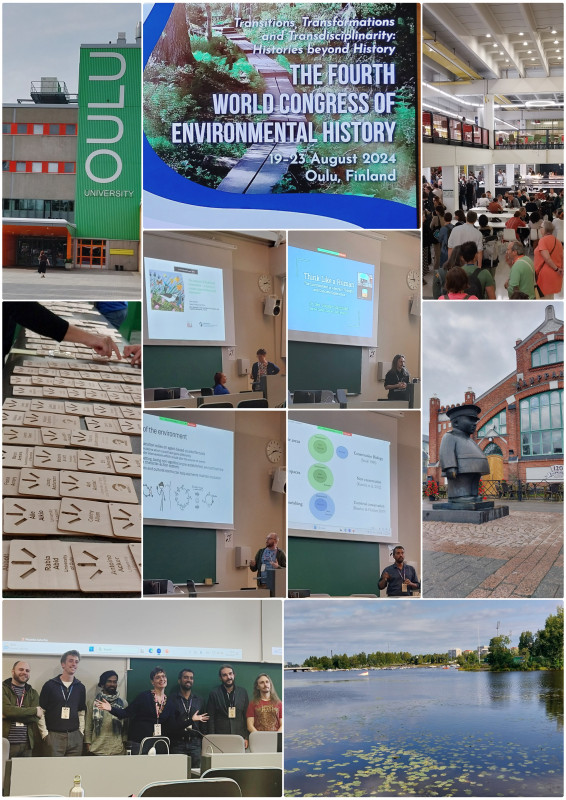News Details

The World Congress of Environmental History (WCEH) is held every 5 years. The fourth WCEH was held at the University of Oulu, Finland, from 19-23 August 2024. This event was the largest WCEH so far, with 973 delegates participating (753 in person, 220 online).
A team of KLI Fellows, comprising Laura Menatti, Corey Bunce, Hari Sridhar, and KLI alumnus Jonatan Palmblad (Rachel Carson Center, LMU Munich), actively participated in the 4th WCEH, presenting their research in a panel titled "The Environment Around Us: Relational Approaches as Common Ground." This panel was organized and convened by Laura Menatti and Jonatan Palmblad, and featured 12 talks across three sessions. It was well-received, with high levels of participation and engaging discussions following the presentations. The panel's success highlights the impactful contributions of the KLI Fellows to the field of environmental history.
Jonatan opened the session with his talk, 'Think like a human: the environment in abstract thought and concrete experience', wherein he discussed the nature of the environment through Lewis Mumford's and other historical thinkers' notion of the environment as primarily the world of concrete experience, secondarily the world as an abstract object of mind. Laura’s paper, 'The concepts of health and environment – a history of constant rapprochements and separations' analysed past and contemporary examples of the health-environment coupling via a philosophical and historical analysis. Corey considered ‘environment' as 'setting' in eco-devo narrative. And finally, Hari explored what the environment in the context of Conservation Biology, and how has it changed over the discipline’s forty-year history as its goals and approaches evolved.
Panel: The Environment Around Us: Relational Approaches as Common Ground
Short Abstract of the panel (as in the WCEH website):
The environment, now a monolithic term, once referred to the relationality between organisms/agents and their surroundings. This panel looks at the history of the concept and how it has been used in different fields, and the possibilities of rethinking its use today to further interdisciplinarity.
Long Abstract of the panel (as in the WCEH website):
What is the environment and in what ways has it been conceptualized, thought, and applied in the last century? Acknowledging that the term "environment" has been used in different ways across the disciplines, this panel aims at presenting different historical examples—with each paper centering on one. While the monolithic notion of "the environment" has played an important role in the history of environmentalism, this panel seeks to challenge the idea that the term should refer to something discrete, abstract, and/or universal. We are especially interested in relational understandings, through which the environment is taken literally as that which environs an organism, subject, or entity—and the way this has been expressed across and beyond academic fields. This includes but is not limited to healthcare and medicine, philosophy, ecology, biology, psychology, and non-academic people and practices. Moreover, while historical inquiries may be ends in themselves, we believe that they in this case may have special relevance today: the so-called "relational turn" in the humanities and social sciences, often without using the term, has opened up a bridge to some of the older ways of using "environment" to make sense of the world. Hence relational approaches across disciplines could help foster methodological—and perhaps ontological—convergences, thereby making the environment a "common ground" for both scientists and scholars. Common ground and a common theoretical language, we believe, are necessary for an interdisciplinary approach to the environmental and climatic crisis. Inter- and cross-disciplinary papers with a historical perspective are welcome.

